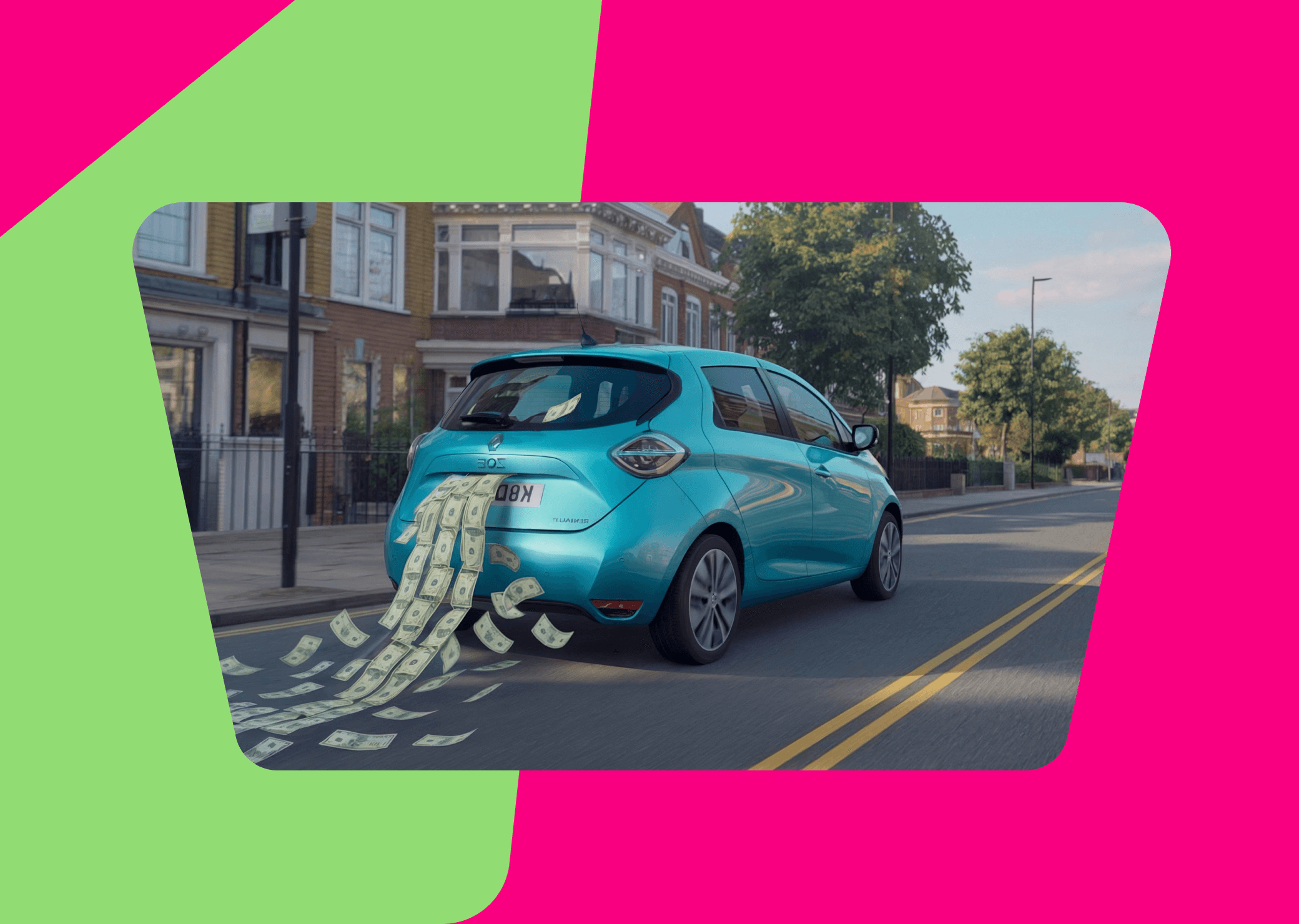- 🗞 News
- Last updated: Sep 19, 2024
- 8 Min Read
Battery Drain: Are EVs losing their charge (and their value)?
Written by

Verified by


See how much you can borrow in 60 seconds
| Representative Example | |
|---|---|
| Loan amount | £10,000 |
| Interest rate | 13.9% APR |
| 54 payments of | £246 |
| Total cost of credit | £3,284 |
| Option to purchase fee | £1 |
| Total payable | £13,285 |
More drivers than ever are ‘going electric’ with over 300,000 electric vehicles (EVs) being sold across the UK in 2023. But with so many unknowns about long-term battery life, and newer models with more impressive ranges regularly cropping up, it’s hard to know whether an EV is a solid investment.
We teamed up with the vehicle valuation experts at Brego to find out how EVs stacked up to traditional petrol and diesel cars when it came to retaining their value. We also got a glimpse into the electric cars that hold their value the best - and worst - to help you navigate your next car purchase and make sure that you’re not buying a car whose value will plummet as soon as it hits the road.
Digging around in Brego’s data on over 40 million vehicles sales across the UK over the past decade, we noticed a significant trend - EVs retained their value considerably worse than other fuel types, on average losing 21% (around £5,124*) of their value in the first year alone.

Whilst electric cars, on average, tend to steeply lose their value, with over 50% of their value dropping within the first four years of ownership, hybrid, petrol and diesel vehicles tended to depreciate at a much slower rate (18%, 19% and 27% respectively).
Why are electric cars depreciating faster?
There are a few reasons why EVs might lose their value faster than other cars:
Technological advancements
The EV market is evolving rapidly, with new models and battery technologies emerging all the time. This can make older electric cars seem outdated sooner, leading to a glut of older models flooding the market.
Battery concerns
Electric car batteries typically last between 10 and 20 years. Range anxiety and potential battery degradation issues, which can occur later in a car’s life, can be a major concern for potential buyers and this can have a knock-on effect on their resale value.
Limited charging infrastructure
In some areas, there is still a lack of charging infrastructure, which can make electric cars less convenient to own and deter buyers.
Government incentives
Government incentives to help encourage EV ownership have slowly dried up, meaning it’s now less attractive to own an electric car in the UK.
Fastest depreciating electric cars in the UK
Exploring valuation data in more detail we wanted to uncover the electric cars which retained their value the worst over a set period in time and with an average amount of usage (three years, 36,000 miles).
The entry-level electric car, the Renault ZOE, performed the worst, losing a whopping 63% of its value. Next was the high-end Audi E-Tron, which saw 59% of its original sale value drop off.
|
Models |
Retained value |
|
Renault ZOE |
37.27% |
|
Audi E-Tron |
41.05% |
|
Nissan Leaf |
41.24% |
|
Jaguar I-PACE |
43.35% |
|
BMW i3 |
45.52% |
Slowest depreciating electric cars in the UK
Looking at the other end of the spectrum, we uncovered the EVs which have been holding their value the best, with the family-friendly Skoda Enyaq topping our list, losing just 30% of its value in the first three years/36,000 miles.
German brands, famed for their reliability, seem to outperform other EVs too, as Volkswagen’s ID.4 and ID.3, as well as the Mercedes-EQA, all retained more than half of their original value after this period.
|
Models |
Retained value |
|
Skoda Enyaq |
60.35% |
|
Volkswagen ID.4 |
55.85% |
|
Mercedes-Benz EQA |
53.75% |
|
Polestar 2 |
51.99% |
|
Volkswagen ID.3 |
51.94% |
Should I buy an electric car?
Whether or not you should commit to an electrified future depends on various factors, including your requirements for a car in the short and long term. Time it correctly, and you could snap up a bargain if the vehicle you’re interested in has weathered the worst of its depreciation. It's worth being aware of the various factors that can affect depreciation whilst browsing for your new ride. Here are a few aspects to keep in mind:
Model and year
Newer models with the latest battery technology are likely to hold their value better than older models.
Mileage and age
As their batteries (and other moving parts) degrade and become less efficient as they are used, more miles on the car’s clock will have a knock on effect on its value.
Battery range
Cars with a beefier battery range are generally more appealing to buyers and will likely depreciate more slowly.
Condition
As with any used car, the overall condition (interior and exterior) of the vehicle will affect its resale value.
Service history
Cars with regular maintenance, servicing and general TLC will tend to be in better condition, a key contributor to their resale value.
Will newer electric cars hold their value better?
It's tough to say with certainty whether newer electric cars will depreciate at a slower rate. As battery technology improves, charging infrastructure continues to expand, and energy costs stablise, we may well see depreciation rates for electric cars start to align more with traditional diesel and petrol vehicles. In the meantime, we suggest bearing these ‘hidden’ costs in mind when weighing up the benefits of switching to electric.
*Average sale price of electric cars in September 2024 was £24,403 according to Brego valuation data. This would reach £19,278 (-£5,124 or -21%) after one year of depreciation.
See how much you can borrow in 60 seconds
| Representative Example | |
|---|---|
| Loan amount | £10,000 |
| Interest rate | 13.9% APR |
| 54 payments of | £246 |
| Total cost of credit | £3,284 |
| Option to purchase fee | £1 |
| Total payable | £13,285 |
Related articles
What to Do If Your Car on Finance Is Broken Beyond Repair
Your car’s dead, the repair bill’s sky-high, or insurance has called it a write-off. But the finance payments? Still ticking...
What Are the Top 5 Used Car Websites in the UK?
Thanks to the internet, searching for a used car in the UK is easier than ever before. You can simply head online, visit a used...
What Is GMFV in PCP Car Finance? Guaranteed Minimum Future Value Explained
GMFV, or Guaranteed Minimum Future Value, is the amount your lender estimates your car will be worth at the end of your PCP...

.webp?width=832&height=592&name=customer-support%20(1).webp)










.webp?width=400&height=285&name=online-shoppers-with-dog%20(1).webp)


.jpg?width=500&height=356&name=Vintage%20car%20going%20to%20an%20old%20town-1%20(1).jpg)





